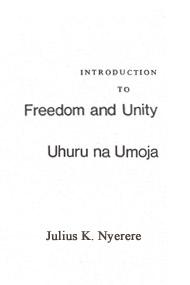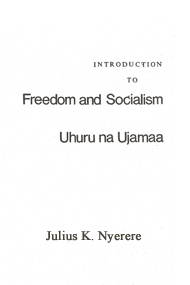Freedom and Unity, Uhuru na Umoja

The Introduction to a collection of speeches and writings could usefully be a description of the events and changing circumstances of the period during which they were produced. But it is not my intention to provide such a background.
To a large extent the items in this book explain their own context, and the events or developments which provoked them; for the rest I think the preliminary paragraphs give sufficient information to make their inclusion intelligible. Instead I propose to enlarge upon the socialist goal which Tanzania has accepted as its objective, and upon the manner iu which Tanzania can progress towards this goal.
The Tanganyika African National Union has been formally committed to socialism since it revised its constitution almost immediately after Tanganyika's independence in December 1961. Much of the legislation and many of the policies adopted by the different Governments—both before and after the Upon with Zanzibar—reflected that commitment. Yet it gradually became clear that the absence of a generally accepted and easily understood statement of philosophy and policy was causing problems, and some Government and Party actions were having the effect of encouraging the growth of non-socialist institutions, values, and attitudes. This was happening because the implications of our broad commitment to socialism were not understood.

